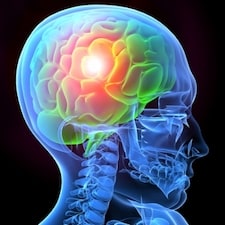Traumatic brain injury, even mild, can lead to sleep disturbance and fatigue
 According to a new study on traumatic brain injury, most victims of mild TBI suffer sleep-wake disturbance and fatigue that can last up to one year or more. For most of them, these problems resolve over time but for some, they persist and become chronic. The study was done in Norway by Simen Berg SaksvikMigle KaraliuteHåvard KallestadTurid FollestadRobert AsarnowAnne VikAsta Kristine HåbergToril SkandsenAlexander Olse. It was published last month in the Journal of Neurotrauma.
According to a new study on traumatic brain injury, most victims of mild TBI suffer sleep-wake disturbance and fatigue that can last up to one year or more. For most of them, these problems resolve over time but for some, they persist and become chronic. The study was done in Norway by Simen Berg SaksvikMigle KaraliuteHåvard KallestadTurid FollestadRobert AsarnowAnne VikAsta Kristine HåbergToril SkandsenAlexander Olse. It was published last month in the Journal of Neurotrauma.
The researchers. compared the sleep quality and fatigue of a sample of patients suffering from mild traumatic injury with a sample of patients suffering from orthopedic trauma and with another sample of regular people from the community not suffering any trauma. Every TBI patient was matched with a patient suffering orthopedic trauma of same age, sex and education and a community person of same age and sex.
Each patient with TBI went through a clinical MRI and was subjected to an interview related to injury characteristics, demography and premorbid health problems. The patients then went through another round of interviews and questionnaires 2 weeks, 3 months and 12 months after the date of the injury. Patients with orthopedic trauma were submitted to similar interviews and questionnaires and non-injured matched people from the community took the 2 weeks, 3 months and 12 months interview and questionnaire.
The researchers performed different types of tests to determine increased sleep need, symptoms of insomnia, pain intensity, excessive daytime sleepiness and fatigue among the patients. They found that the pain intensity was pretty much the same for patients who suffered TBI and patients who suffered an orthopedic trauma after 2 weeks, 3 months and one year. TBI patients reported pain mostly in their head, neck and face and orthopedic patients in other parts of their body. Patients who suffered TBI consistently reported having more problems with sleep need, poor sleep quality, excessive daytime sleepiness than the two other groups under study. Increased sleep need, poor sleep quality, excessive daytime sleepiness and fatigue were more often reported by female TBI patients than male. Fatigue was predominant among older TBI patients. The researchers also found that patients who reported previous psychiatric disorder had a higher risk to suffer poor sleep quality and fatigue. Many of the patients who suffered poor sleep quality, excessive daytime sleepiness and fatigue continue to experience these symptoms after 3 months for both TBI patients and orthopedic trauma patients.
Read more here
 New York Personal Injury Attorneys Blog
New York Personal Injury Attorneys Blog


